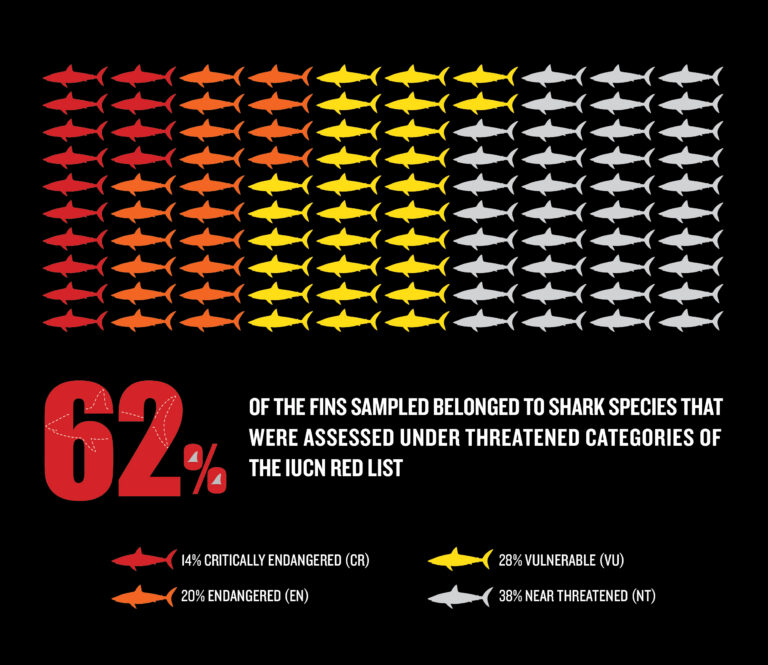A chef pours shark fin soup into a clay pot at a restaurant in Bangkok’s Chinatown. A bowl of shark fin soup in downtown Bangkok ranges from 200 Baht (6 USD) to as high as 6,000 Baht (172 USD). Photo courtesy of WildAid ©
Many shark species are at risk of extinction. Based on a recent study by Rapid Asia on behalf of WildAid, demand for shark fin in Thailand has declined over the past six years. However, Thailand remains an active market for shark fin consumption. Based on DNA testing, the recently published study ‘Endangered Sharks in Your Bowl’ reports that many consumers are eating endangered sharks unwittingly.
Previous studies found that overfishing and consumer demand have driven reef sharks towards extinction. It was estimated that between 26 to 73 million sharks were killed annually during 2000-2010 for the global fin trade. A 2015 FAO report revealed that the unstable shark fin trade was closely related to the decline in shark populations in various parts of the world. Between 2012 and 2016, Thailand exported over 22,466 tonnes of shark fin and processed shark fin products, ranking as the world’s number one exporter during that period.
Research using DNA testing was carried out by King Mongkut Institute of Technology Ladkrabang, Aow Thai Marine Ecology Center, and WildAid in collaboration with Thailand’s Department of Fisheries. Titled “DNA-based species identification of shark fins traded in Thai markets,” the research was published in the scientific journal ‘Conservation Genetics’ volume 24 in 2023.
Collecting 206 fin samples (of which 166 were identified successfully) from fish markets in Thailand, the research found fins from at least fifteen different shark species. Nearly two-thirds (62%) of the fins tested were from shark species classified as “threatened” in the IUCN Red List. Five shark species were also categorised under the IUCN Red List and Thailand Red Data.

The online survey with 1,007 urban Thais, carried out by Rapid Asia, found that demand for shark fin in Thailand has declined over the past six years (between 2017 and 2023). It is estimated that the number of shark fin consumers has dropped from around 6.6 million to around 5.3 million. The frequency of regular shark fin consumption also declined from 86% of consumers in 2017 to 60% in 2023, indicating there has been a shift from regular to more occasional consumption However, despite the decline, the study confirmed that Thailand remains an active market for shark fin consumption.
The two studies confirm the need to continue efforts to reduce demand for shark fin consumption. Social and behaviour change communications in combination with multistakeholder collaboration will be needed to save vulnerable shark species around the world. The report outlines four important recommendations:
- Improve traceability system for shark fin trade: due to its significant role in the international trade of shark fin, Thailand needs to rapidly strengthen its capability to trace the supply chain of shark fin while CITES-listed shark species should receive full attention and be properly monitored and reported periodically.
- Stock and trade monitoring of dominant and threatened species: while the IUCN Red List status should be re-evaluated and likely revised due to specific species prevalence in the marketplace, site-based management for shark conservation needs to be strengthened, especially at known shark hotspots. It is important to expand marine protection coverage and support the global goal of 30% protection of the world’s oceans by 2030.
- Conduct random DNA testing: additional DNA-based identification methods are recommended to detect threatened species and CITES-listed species in the shark fin trade. The testing will provide valuable information for future evaluations.
- Further research: more studies are recommended such as studies of relationships between fin length and mature size of sharks to help identify a recommended minimum fin size that should be required by sustainable fisheries targeting sharks. This could help maintain a healthy shark population.
The full report report can be found here.
If you found this article useful, please remember to ‘Like’ and share on social media and hit the ‘Follow’ button never to miss an article. You may also find this blog of interest: Is It Time To Revive The Fin-Free Thailand Campaign?
About the authors: Daniel Lindgren is the Founder of Rapid Asia Co., Ltd., a management consultancy firm based in Bangkok that specialises in evaluations for programs, projects, social marketing campaigns and other social development initiatives. Israr Ardiansyah is an independent feature writer working with Rapid Asia.

